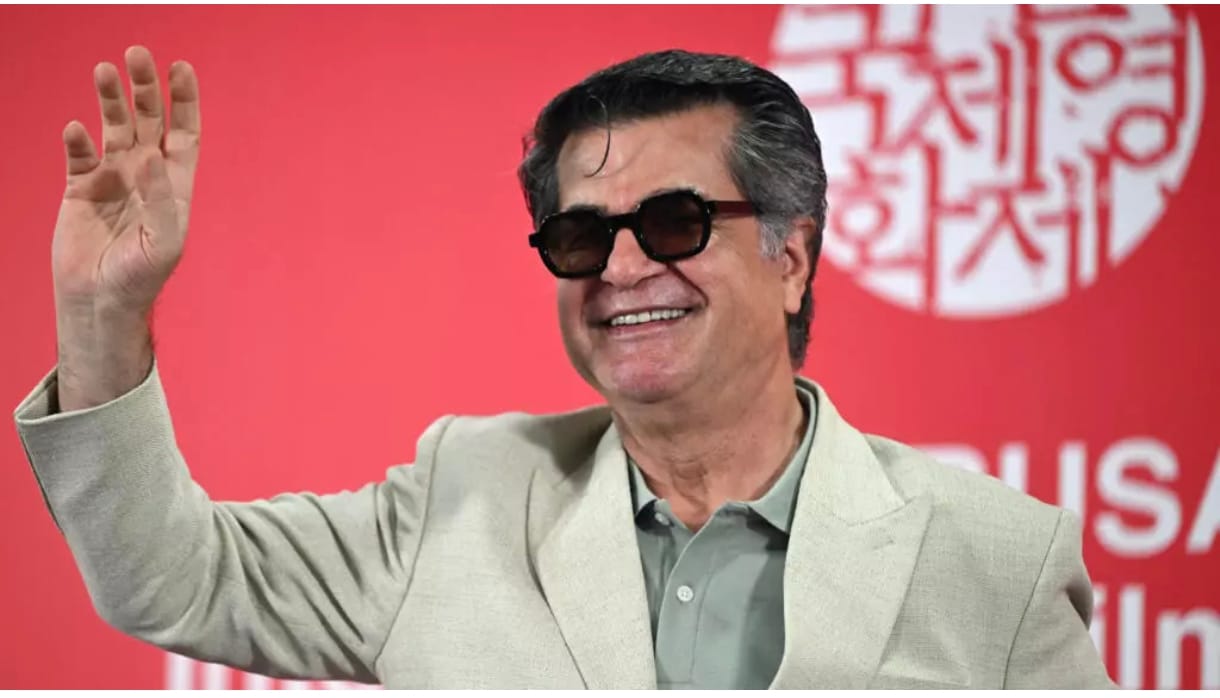Jafar Panahi Receives Asian Filmmaker of the Year Award at Busan
.
VERDICT: Iranian cineaste Jafar Panahi talks about his 30-year relationship with BIFF and calls for a change in the Academy Awards’ submission rules.
At film festivals, it’s not uncommon to see filmmakers sneak out and light up after their own press conferences. But to see Jafar Panahi catching some air outside the Busan Cinema Center is, in some ways, still quite surreal: as recently as two years ago, the Iranian cineaste was still very much a prisoner in his own country, to the point of having gone on a hunger strike in an attempt to have the authorities release him from yet another spell in jail.
But here he is, taking a break after a not particularly grueling meeting with the local press a day after receiving the Asian Filmmaker of the Year award from the Busan International Film Festival (BIFF). The honorary prize is the latest of many given to him since his travel ban was rescinded earlier this year, a twist which allowed him to present his latest film It Was Just An Accident in Cannes.
Panahi’s whirlwind trip to Korea is just one of the many stops on his latest international tour, with the director departing for the San Sebastian festival just three days after touching down in Busan. Then again, he said it’s a trip he wouldn’t have missed, given his close affiliation with BIFF: his first film, The White Balloon (1995), participated in the very first edition of the festival, and he has since returned for another five times.
“Before I was prevented from leaving the country, I’ve always been coming to the festival,” says Panahi at the press conference. “I’m sorry this visit was very short, as I had to travel to many countries… I really hope I can come here and stay more, bring my wife and travel around and meet everybody, especially since I love to eat seafood from East Asia.”
Culinary jokes aside, Panahi says his relationship with Busan was built on his long-running friendship with Kim Ji-seok, the festival’s co-founder and programming chief who passed away during a visit to the Cannes Film Festival in 2017.
“When I was prevented from leaving Iran, he came and visited me,” Panahi recalls. “Before he went to Cannes and left us [in 2017], he came to Iran for a film festival and came to my house; we said we would meet in Korea. So this time I wanted to pay tribute to him in his home [country].”
Panahi’s very brief appearance in Busan might also be down to the imminent opening of It Was Just An Accident in Korean theaters on October 1. While the film will also unspool in French cinemas on the same day, the time difference between the two countries –Seoul is seven hours ahead of Paris – will make Korea the first country where Panahi’s latest will be commercially released.
The director’s appearance in Busan came right after the announcement of the selection of It Was Just An Accident as France’s official submission in the Best International Feature category at the Academy Awards. The film was co-produced by Iran and partners in France and Luxembourg, with post-production completed in Paris before its Palme d’Or-winning premiere at Cannes.
Expressing his frustration over not being able to represent his own country at the Oscars, Panahi called for changes to the Academy’s rules in order to heighten the presence of more independent-minded and anti-establishment artists, at the most high-profile film ceremony of the year.
“If we wanted to submit the film [for the long-list at the Oscars], we have to get permission from our own country,” he said. “In the closed-up kind of country we are in, we have to get permission – it’s a problem for a country like Iran or China. So I think the Academy should find a way to not tie filmmakers to [their] countries.”
He said such complications had once scuppered his 2006 film Offside, about a group of young women struggling against the authorities to get into a football match, from competing at the Academy Awards. “Sony [Pictures Classics] distributed the film and wanted to introduce it to the Academy, but the regulation was that the film must be screened in [the filmmaker’s] own country. But [the officials] didn’t accept the screening of the film, even for one week, so Sony had to give up.”
“I think independent filmmakers must get together to find a way… so that they will not face this kind of problem in their own country,” he added.
Official reaction to Panahi’s success at Cannes in May was muted, with the authorities remaining silent when the filmmaker returned to Iran from France. In a recent article celebrating the “global recognition” of Iranian cinema at international film festivals and the Academy Awards, the government-backed Tehran Times only referred to Panahi’s first two films – the comparatively less political The White Balloon and The Mirror. There was no mention of It Was Just An Accident.
Panahi’s freedom to travel in and out of Iran, plus what seems to be a palpable liberalization of the Islamic Republic’s once-stringent moral laws, would suggest that the country may be undergoing a thaw. But the director said the struggle continues for him and his peers.
“My [uncredited] co-writer for [It Was Just An Accident] was sentenced to jail, but two days ago he was freed,” he said. “He wasn’t sentenced [to prison] only for this film – he was 48 years old and he has spent a fourth of his life in jail. He’s a journalist, a human rights activist and one of the best men I have ever met. So when you are living under a dictatorship, the pressure from the government will make you face a lot of problems. You must find a way to live, aiming to make the films you want to.”

